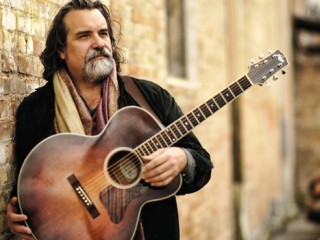
Darrell Scott biography
Date of birth : 1959-08-06
Date of death : -
Birthplace : London, Kentucky,U.S.
Nationality : American
Category : Arts and Entertainment
Last modified : 2024-08-06
Credited as : Singer-songwriter, Country artist, Multi-instrumentalist, Nashville session musician, Tim O'Brien, Aloha from Nashville, Theater of the Unheard, Dixie Chicks
1 votes so far
Darrell Scott: A Versatile Force in Country Music
James Darrell Scott, commonly known as Darrell Scott, is a celebrated American singer-songwriter and multi-instrumentalist. Born on August 6, 1959, in London, Kentucky, Scott has become one of Nashville's premier session instrumentalists and a prolific songwriter. He is the son of musician Wayne Scott, with whom he has frequently collaborated, and often performs alongside his brother, David Scott, on keyboard.
Darrell Scott's contributions to country music are extensive, with his songs recorded over 70 times by renowned artists such as the Dixie Chicks and Garth Brooks. Despite his significant impact behind the scenes, Scott has gradually stepped into the spotlight with his own solo career.
Early Life and Musical Beginnings
Scott was born in London, Kentucky, in the heart of the coal-mining region. His song "You'll Never Leave Harlan Alive," recorded by Brad Paisley and Patty Loveless, reflects the area's tough living conditions. Scott's father was a tobacco farmer and part-time country musician, influencing Scott's early musical exposure. The family later moved to Gary, Indiana, a city marked by its steel mills and economic struggles, themes that would later surface in Scott's songwriting.
Musical Journey and Education
Scott's musical journey began with his father's band, performing as far away as Alaska. By 16, he was playing in Southern California bars and later moved to Canada to immerse himself in the songwriting scene. He backed the Canadian country band the Mercey Brothers on steel guitar and contributed his own songs to their repertoire.
Seeking formal education, Scott relocated to Boston, studying poetry with Pulitzer Prize-winning writer Philip Levine at Tufts University. His Boston years were marked by performances in local clubs and a weekly trio gig at the Warren Tavern in Charlestown.
Breakthrough and Move to Nashville
In 1990, Scott signed a recording contract with SBK and recorded an album in Memphis. Despite the album's shelving due to the lack of a hit single, Scott's journey was far from over. Encouraged by a friend, he moved to Nashville, a city that embraced his instrumental talents. Scott joined Guy Clark's touring band and became a sought-after session musician, playing for stars like Trisha Yearwood and Randy Travis.
Solo Career and Songwriting Success
Scott's first solo album, Aloha from Nashville (1997), on the Sugar Hill label, garnered attention from Nashville's creative community. His songs became hits for artists like Travis Tritt ("It's a Great Day to Be Alive") and the Dixie Chicks ("Heartbreak Town"). Scott followed up with Family Tree, which included the title track recorded by Darryl Worley.
His collaboration with Tim O'Brien led to several successful songs, including "When There's No One Around" recorded by Garth Brooks, and their album Real Time, which featured "Long Time Gone," a hit for the Dixie Chicks.
Continued Success and Recognition
In 2003, Scott revisited his unreleased SBK album, re-recording the songs with a full band and releasing them as Theater of the Unheard on his own Full Light label. The album received critical acclaim and landed on several end-of-year ten-best lists.
Scott continued to demonstrate his versatility with Live in NC (2004), showcasing his instrumental prowess. His song "Hank William's Ghost" won the 2007 Song of the Year award from the Americana Music Association. In 2011, his album A Crooked Road won the Country Album category at The 10th Annual Independent Music Awards.
Collaborations and Legacy
Scott's collaborative spirit has seen him work with a host of notable musicians, including Steve Earle, Emmylou Harris, and Guy Clark. His music has attracted a growing fanbase, and he tours regularly with his band. Despite his extensive contributions to the industry, Scott remains a dynamic and evolving artist, continually pushing the boundaries of country and roots music.
Discography of Darrell Scott:
1997: Aloha From Nashville
1999: Family Tree
2000: Real Time (with Tim O'Brien)
2003: Theatre of the Unheard
2004: Live in NC (with Danny Thompson and Kenny Malone)
2006: The Invisible Man
2008: Modern Hymns
2010: A Crooked Road
2012: Long Ride Home; Live: We're Usually a Lot Better Than This (with Tim O'Brien)
2013: Memories and Moments (with Tim O'Brien)
2015: Ten: Songs of Ben Bullington
2016: Couchville Sessions
2020: Sings the Blues of Hank Williams
















